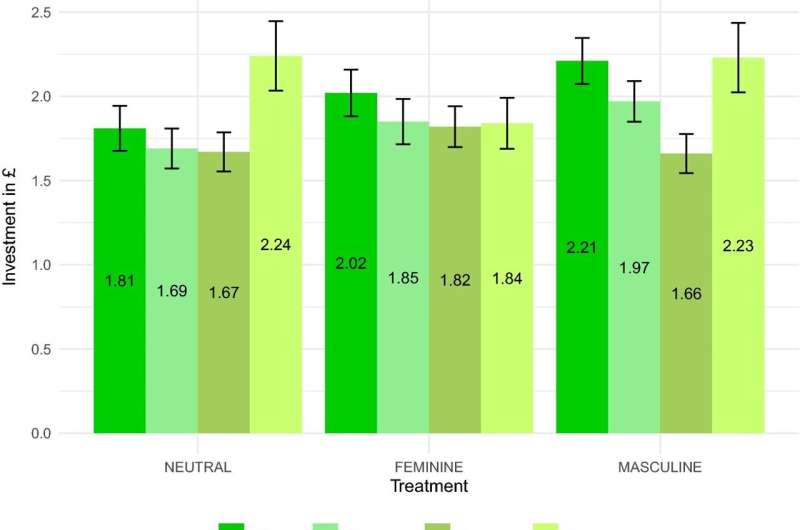Gender or biological sex not as decisive in economic decision-making as previously thought, study finds

Gender and sex assigned at birth are not as decisive in economic decision-making as previously thought, a new study finds.
A new study published in Scientific Reports is the first analysis of transgender and cisgender economic behavior, and the first to consider whether sex assigned at birth plays a significant part in economic decisions.
Helena Fornwagner and Brit Grosskopf from the University of Exeter Business School and Alexander Lauf, Vanessa Schöller, and Silvio Städter (University of Regensburg) have for the first time investigated the role of gender identity and biological sex in economic decision-making.
The researchers explored whether being transgender or cisgender impacted factors that could influence whether we apply for a new job, invest in a risky asset or donate to charity.
In a controlled experimental study featuring 780 participants, with around half identifying as transgender, they hypothesized that if gender identity does determine levels of competitiveness, risk-taking or altruism with money, then those with the same gender identity (cis men and trans men, and cis women and trans women) will make similar decisions. Those with a different gender identity would make significantly different economic decisions. Moreover, it was suggested that participants having the same biological sex (cismen and transwomen, and ciswomen and transmen) would behave comparably.
The researchers used a series of well-known economic experiments to determine how competitive the participants were with money, their willingness to take risks and how willing they were to give to charity. Before making any decisions, the participants completed a word search priming exercise that subconsciously assigned them a masculine, feminine or gender-neutral identity by asking them to find gender-specific words.
Using their study design, the researchers first test for a correlation impact of gender and sex by comparing the behavior of cis-gender men, cis women, trans men and trans women. Second, the priming intervention enabled to control for causal inferences about gender and behavior.
But in contrast to previous studies that have established links between gender and economic behavior, the researchers found that gender and biological sex actually make no significant difference to our economic decisions.
Part of their rationale for this unexpected finding is that educational initiatives and a greater awareness of gender equality in private and professional settings have narrowed any economic behavioral differences, which were first established in studies almost two decades ago.
Dr. Fornwagner said, "Gender has long been reported to be a driving factor in domains such as competitiveness, risk-taking and altruism, but our study is the first to ask how much can be associated with gender, and how much is based on the biological sex people are endowed with.
"Despite the partly unexpected findings that led us to conclude that the role of gender and sex is not as decisive for economic behavior as previously assumed, we believe there are several important take-aways from this study."
"Transgender individuals have become a more and more visible part of society. Thus, we think it is crucial to understand their economic behavior and essential to expand experimental economic research to all groups summarized under the LGBTQ+ flag to acknowledge the colorful society we are already part of also in our scientific research."
"On the robustness of gender differences in economic behavior" is published in Scientific Reports.
More information: Helena Fornwagner et al, On the robustness of gender differences in economic behavior, Scientific Reports (2022). DOI: 10.1038/s41598-022-25141-1
Journal information: Scientific Reports
Provided by University of Exeter





















